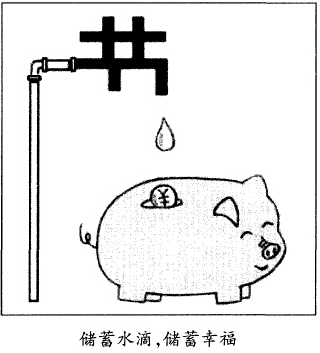2017年考研英语模拟试题二
-
You are a salesman in a pharmacy company. Write a letter to Mr. Wang, one of your customers, to introduce a new medicine to him.You should write about 100 words on the ANSWER SHEET.Do not sign your own name at the end of the letter. Use " Li Ming" instead.Do not write the address.
-
Study the following drawing carefully and write an essay in which you should 1)describe the drawing, 2)interpret its meaning and implications, and 3)give your comments. You should write 160-200 words neatly on the ANSWER SHEET.(20 points)

-
【B19】
- A.hampers
- B.distinguishes
- C.duplicates
- D.resembles
-
【B20】
- A.highlights
- B.implies
- C.entails
- D.exclaims
-
【B16】
- A.set about
- B.sit for
- C.engage in
- D.go through
-
【B17】
- A.stronger
- B.closer
- C.further
- D.weaker
-
【B18】
- A.when
- B.that
- C.which
- D.as
-
【B14】
- A.controversial
- B.associated
- C.particular
- D.relevant
-
【B15】
- A.Even
- B.So
- C.But
- D.And
-
【B13】
- A.attach
- B.subject
- C.submit
- D.stick
-
【B11】
- A.procedures
- B.sections
- C.progress
- D.stages
-
【B12】
- A.which
- B.that
- C.as
- D.what
-
【B10】
- A.however
- B.whenever
- C.whatever
- D.whichever
-
【B9】
- A.depict
- B.manifest
- C.predict
- D.specify
-
【B8】
- A.bring forward
- B.think of
- C.check out
- D.catch on
-
【B7】
- A.assign
- B.display
- C.perform
- D.overtake
-
【B4】
- A.let
- B.put
- C.ran
- D.got
-
【B5】
- A.measures
- B.calculates
- C.assesses
- D.evaluates
-
【B6】
- A.between
- B.during
- C.across
- D.throughout
-
【B2】
- A.forgetful
- B.absent
- C.faultless
- D.unavailable
-
【B3】
- A.retrieved
- B.recognized
- C.claimed
- D.accumulated
-
You probably have a long mental list of moments and facts you wish you could remember—but actually you cannot. The good news,【B1】______, is that while such memories may be currently【B2】______, they are not entirely gone, and could theoretically be【B3】______, according to a new brain research. In the study, biologist Jeffrey Johnson【B4】______16 college participants through an FMRI machine (which【B5】______nervous activity via blood flow)to compare brain patterns【B6】______memory formation and recall. First, he showed the students various common words and had them【B7】______a few tasks: say the word backwards in your head,【B8】______its uses, and picture how an artist would【B9】______it. Then, 20 minutes later, after the students re-entered the FMRI machine, Johnson showed them the list of words and asked them to recall【B10】______they could from before. Finally, he compared brain activity from both【B11】______and what he found will surprise you. Using【B12】______is called "pattern analysis" , its possible to【B13】______a unique pattern of brain activity to every individual thing we do. This means that when a participant says the word "apple" backwards the【B14】______pattern of brain activity is different from when he pictures the fruit.【B15】______interestingly, there is close similarity between the pattern that emerges when we【B16】______an activity and when we later recall it. The stronger our memory, the【B17】______the pattern, but as Johnson found, even at a moment【B18】______we cannot remember anything, our nerve cells still fire in a way that【B19】______the activity of when we formed the memory. This【B20】______that sometime in the future we may be able to retrieve the memories we thought wed lost forever.
【B1】
- A.although
- B.rather
- C.though
- D.therefore
